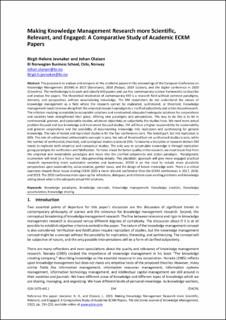Making Knowledge Management Research more Scientific, Relevant, and Engaged: A Comparative Study of Academic ECKM Papers.
Peer reviewed, Journal article
Published version

View/
Date
2021Metadata
Show full item recordCollections
- Scientific articles [2173]
Original version
Electronic Journal of Knowledge Management. 2021, 19 (2), 194-210. https://doi.org/10.34190/ejkm.19.2.2536Abstract
The purpose is to analyse and compare all the academic papers in the proceedings of the European Conference on Knowledge Management (ECKM) in 2017 (Barcelona), 2018 (Padua), 2019 (Lisbon), and the digital conference in 2020 (Coventry). The methodology is to code and classify 440 papers and use five contemporary science frameworks to describe and analyse the papers. The theoretical implication of contemporary KM is a research field without common paradigms, domains, and perspectives without accumulating knowledge. The KM researchers do not understand the nature of knowledge management as a field where the research cannot be replicated, synthesized, or theorized. Knowledge management needs to move along from the empirical research paradigm to a clarified subjectivity and action-basedresearch. The criticism implying acceptable/unacceptable solutions and constructed adequate/inadequate solutions for corporations and societies have strengthened their place, offering new paradigms and perspectives. The way to do this is to let in controversial, greener, and sustainable studies, whatever objectivity or subjectivity the studies have. We need more actual problem focused and less knowledge and instrument focused studies. KM will have a higher responsibility for sustainability and greener corporations and the possibility of accumulating knowledge into replication and synthesizing for general knowledge. The rate of tested and replicated studies is for the four conferences zero. The tested part, but not replicated, is 80%. The rate of untheorized untheorizable concepts is zero, the rate of theorized but not synthesized studies is zero, while the number of synthesized, theorized, and conceptual studies is around 20%. To become a discipline or research domain KM needs to replicate both empirical and conceptual studies. The only way to accumulate knowledge is through replication giving paradigms for verification and falsification. To move ahead for better quality in the research, we must break free from the empirical and materialistic paradigms and move into the clarified subjectivity and action paradigm. Paradigmatic ecumenism will tend to a fiercer but idea-generating debate. This pluralistic approach will give more engaged practical research representing more sustainable societies and businesses. ECKM is on the road to include more pluralistic perspectives upon sustainability, value creation, gender issues, and the design of future knowledge work. There is a critical openness toward these issues making ECKM 2020 a more relevant conference than the ECKM conferences in 2017, 2018, and 2019. The 2020 conference more open up for reflections, dialogues, and criticism upon existing problems and knowledge asking about what is the adequate actual KM solutions.
Publisher
Academic Conferences International LimitedJournal
Electronic Journal of Knowledge ManagementCopyright
The authors
Except where otherwise noted, this item's license is described as Attribution-NonCommercial-NoDerivatives 4.0 Internasjonal
Related items
Showing items related by title, author, creator and subject.
-
Knowledge donating and knowledge collecting - The moderating role of social and economic leader-member exchange
Dysvik, Anders; Buch, Robert; Kuvaas, Bård (Journal article; Peer reviewed, 2015)Purpose – The purpose of this paper is to investigate whether the relationship between employees’ knowledge donating and managers’ knowledge collecting is moderated by social leader-member exchange (SLMX) and economic ... -
In the right place at the right time! The influence of knowledge governance tools on knowledge transfer and utilization in MNEs
Andersson, Ulf; Buckley, Peter J.; Dellestrand, Henrik (Journal article; Peer reviewed, 2015)This article examines the utilization of knowledge transferred between sending and receiving subsidiaries within multinational enterprises. A model was developed and tested on 169 specific knowledge transfer projects. The ... -
The knowledge protection paradox: imitation and innovation through knowledge sharing
van Oorschot, Kim; Solli-Sæther, Hans; Karlsen, Jan Terje (Journal article; Peer reviewed, 2018)Western multinational corporations (MNCs) that want market access in China have to share knowledge with Chinese partners. This may expose them to imitation, so MNCs prefer to protect knowledge resulting in a strategic ...
